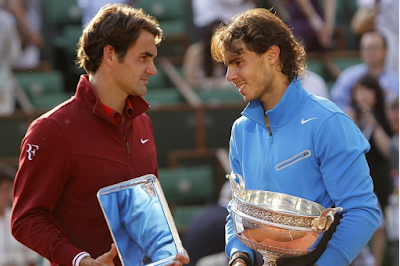In his defeat, Federer was called to take the microphone first. He spoke in French with ease and confidence to the crowd at Stade Roland Garros. They were already pulling for him and the fact that he addressed them graciously in their language was the “icing on the cake.” As he spoke, I wondered how many other languages he knows. I have heard him speak in English many times. Perhaps he knows Italian or German. Is Germanic-Swiss the Basil native’s first language? Must be nice…
When it was time for Nadal to behold his sixth French Open trophy, he tried but humbly admitted that he did not know French, only English or Spanish. He congratulated and thanked Federer for another tough match. Those are tough words—they are important to say to one’s opponent, but also difficult to hear (as the opponent). Still, Nadal has tremendous respect for Fed and the authenticity of his message knows no language barrier.
He then was so overcome with emotion that he began to speak in Spanish, his first language. You could see him relax. His body language in addition to his native tongue revealed how grateful he was for the support of his family members. He was glad to be healthy again. He loves the game and he loves to win, but it was obvious to me that he loves his country as well. Language is so tied to culture and this young man from Mallorca was unable to hold back the tears as they raised the Spanish flag and played his national anthem.
Just ten hours after the conclusion of the French Open, I arrived in Tacoma, Washington for a two-week Immersion with students from St. Ignatius. We were welcomed into a new community and culture: L’Arche. L’Arche seeks to “create communities which welcome people with a mental handicap. L’Arche aims to respond to the distress of those who are too often rejected, and give them a valid place in society. In a divided world, L’Arche wants to be a sign of hope as it seeks to reveal the particular gifts of these people with varying levels of developmental disabilities."
We met many core-members (they don’t refer to people with disabilities here as clients) and “live-ins” (assistants) but we spent most of the evening with Doug, a live-in who is able to maintain some independence within the community. He showed us a rose bush he planted to honor his deceased parents. He was proud to share a shed he built and the barbeque that is “his baby.” At times, he is very hard to understand due to a significant speech impediment but those who live with him fully understand what he is able to say.
At the end of our day, one of my students said, “I can’t wait to learn his language.” I was moved by her desire to know and understand what he wants to share with us. And they will understand his language—because this place has a way of breaking open our humanity. L’Arche recognizes this as a fundamental truth. “Whatever their gifts or their limitation, people are bound together in a common humanity.”
We also met a woman Nancy, who is confined to her wheelchair. Although she cannot speak, she is able to communicate with us through sign language. Her language is intuitive and something we are anxious to learn; she has already taught us the alphabet and colors.
Another fundamental principle of L’Arche is “People with a mental handicap often posses qualities of welcome, wonderment, spontaneity and directness. They are able to touch hearts an to call others to unity through their simplicity and vulnerability.” Nancy taught us something so basic—her language. And in doing that, she confirmed that anyone can be a teacher; we enjoyed being her students. A disability does not necessarily mean an inability.
L’Arche believes “that the deepest need of human beings is to love and be loved.” What has been quite obvious in our short time here is that the language that underscores all that people do here is love. Words are often remiss when it comes to love, but in terms of communicating that language, each individual finds their own way to speak it.
Much in the same way that Fed and Nadal found their own way to communicate to one another, their loyal fans and all those who love and respect the game of tennis in the way that they do. And the larger truth is that our common humanity reveals that we will find a way to share our emotions--the highs and lows, the good and bad regardless of the language we speak...French, Spanish, English, Sign, etc. as I witnessed at the trophy ceremony and L'Arche today.






Loved this Anne! Thank you for your reflections on L'Arche and of course, Fed and Nadal :)
ReplyDeleteAnne, Tacoma L'Arche was my JV placement. I loved reading this post and I love the pic of Sue and Shaun. Such a place of encounter with Jesus!
ReplyDeleteClaire-I spent a lot of time at your JV Home. I can only imagine the depth of the experience you had! "A place of encounter with Jesus"...thank you for those words!
ReplyDelete